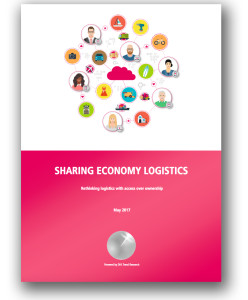Embracing digital platforms and business models built around sharing not owning assets presents a significant future opportunity for the logistics industry, according to a new report by DHL.
 The report, entitled ‘Sharing Economy Logistics – Rethinking Logistics with access over ownership’ looks at best practices in the Sharing Economy from other industries, and presents practical applications of the Sharing Economy in logistics.
The report, entitled ‘Sharing Economy Logistics – Rethinking Logistics with access over ownership’ looks at best practices in the Sharing Economy from other industries, and presents practical applications of the Sharing Economy in logistics.
“The concept of sharing is nothing new, but today people can share assets and use sharing services at the speed and scale of three billion smartphone users worldwide. Naturally this started with high-value assets like rooms and cars, but the underlying concept can be applied to almost anything now,” said Matthias Heutger, senior vice president strategy, marketing & innovation, DHL Customer Solutions & Innovation.
In the Sharing Economy, users get temporary access to an asset, service or skill owned by someone else and which would otherwise be underused. Not only does this maximise return on investment through greater utilisation, it produces a new revenue stream in the form of rental fees for the asset owner. Sharing is also good for the environment as it leads to fewer new assets being produced, and existing ones are being used more often.
The report suggest that sharing of warehousing space, transport capacities, operational data, and staffing are just some of the examples where the sharing economy could be effectively employed in logistics.
It could be applied across all parts of the logistics value chain to improve or change logistics operations – as well as create new businesses. For example, according to research, one in four trucks on US and EU roads are driving empty or typically only half-loaded.
Digital platforms provide an instant snapshot of availability and the ability to access spare capacity in almost any truck, including smaller delivery vehicles or even privately owned cars on a day-to-day basis.
Multi-customer warehouses help third party logistics providers achieve greater economies of scale by consolidating fulfilment, demand and know-how between several customers within a single site. Taking the concept of space sharing from the hospitality sector as a role model, sharing excess warehouse capacity would bring great financial and productivity benefits, says the report.






